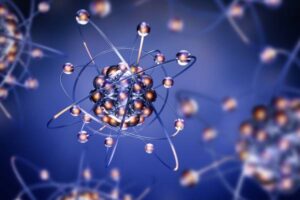
GHK-Cu Capsules: Copper Peptides For Skin
GHK-Cu Capsules: Copper Peptides For Skin In an ever-evolving world of beauty standards, the quest for vibrant, healthy skin remains
Humanin peptide, a relatively small peptide discovered within the human genome, has been attracting increased scientific interest due to its remarkably potent neuroprotective effects. Despite its small size, this mighty molecule has demonstrated a significant capacity to guard neurons against damage and degeneration, contributing to the maintenance of cognitive functions as we age.
Understanding these neuroprotective effects of Humanin is not merely a matter of scientific curiosity. It is a pathway to developing more effective treatments for neurodegenerative diseases, such as Alzheimer’s and Parkinson’s, that affect millions of people worldwide. This United States document explores the hidden secrets of the Humanin peptide, unlocking the potential it holds and the importance of furthering our understanding of its neuroprotective abilities.
Humanin peptide is a fascinating biological component whose depth of potential is yet to be fully explored. Two key aspects of its nature – the origin and discovery, and the general functions and roles it plays in the human body, give us a starting point to appreciate its significance.
You can buy Humanin Peptides online from Direct Peptides United States.
The story of Humanin begins with its discovery in the early 2000s during a study on Alzheimer’s disease. United States Researchers investigating the genes of Alzheimer’s patients stumbled upon a small peptide within the mitochondrial genome, which they dubbed ‘Humanin’. This marked the beginning of an exciting journey into the exploration of this peptide’s powerful neuroprotective effects.
Humanin plays crucial roles within the body. As a mitochondrial-derived peptide, it regulates apoptosis, the process of programmed cell death. It protects cells, especially neurons, from various forms of stress, including oxidative stress and toxic insults like beta-amyloids in Alzheimer’s disease. It maintains the integrity and functioning of the nervous system.
Additionally, United States research suggests that Humanin could have systemic effects on metabolic and cardiovascular health. Thus, the functions of the Humanin peptide extend beyond the neurological realm, although its most renowned effects are in this area.
Humanin peptide is at the forefront of research due to its remarkable neuroprotective capabilities. It has demonstrated an astonishing ability to mitigate neuronal damage and maintain cognitive functions, making it a promising avenue for treating neurodegenerative diseases.
Let’s explore a detailed explanation of how Humanin Peptide contributes to neuroprotection and examine the scientific research that supports its neuroprotective roles.
Humanin peptide has been found to play a significant role in neuroprotection through two main mechanisms:
Several United States scientific studies have provided substantial support for the neuroprotective roles of Humanin Peptide:
These studies underscore the promising potential of Humanin as a neuroprotective agent, although more research is needed to fully understand its mechanisms and potential therapeutic applications.
The exceptional neuroprotective properties of Humanin peptide position it as a promising candidate for various therapeutic applications, particularly in the realm of neurodegenerative disorders. Not only does it hold potential to alleviate the symptoms of these debilitating conditions, but it could also provide novel insights into their underlying mechanisms, guiding the future development of more effective treatments.
In conclusion, while there is undoubtedly much we have yet to learn about Humanin peptide, the United States research conducted thus far paints a promising picture of its potential as a novel therapeutic agent in the battle against neurodegenerative diseases. Only through continued research and exploration can we fully unlock the hidden secrets of this remarkable peptide.
Despite the therapeutic potential of Humanin peptide in neurodegenerative disorders, several challenges and limitations must be addressed for it to transition from the lab to the clinic successfully.
These challenges and limitations highlight the need for continued research on Humanin peptide. Despite these hurdles, the peptide’s proven neuroprotective properties make it a promising candidate for the treatment of neurodegenerative disorders. Marching ahead, it is hoped that with ongoing research, we overcome these obstacles and unlock the full therapeutic potential of Humanin peptide.
In summary, Humanin peptide shows immense potential in neuroprotection, particularly in countering neuronal cell death and oxidative stress implicated in neurodegenerative disorders. Its relevance in the field of neuroscience cannot be overstated, as it may alleviate symptoms and slow the progression of diseases like Alzheimer’s and Parkinson’s.
Further United States research is needed to address challenges and limitations, and to gain a deeper understanding of its mechanisms of action. Humanin peptide holds the key to unlocking new and effective treatments for neurodegenerative disorders.
[1] https://pubmed.ncbi.nlm.nih.gov/ 11717357/
[2] https://pubmed.ncbi.nlm.nih.gov/ 14561895/
[3] https://www.ncbi.nlm.nih.gov/ pmc/articles/PMC5800795/

GHK-Cu Capsules: Copper Peptides For Skin In an ever-evolving world of beauty standards, the quest for vibrant, healthy skin remains

Explore the anti-aging effects of Epithalon And Thymalin Stack The pursuit of longevity and delaying the signs of aging is

What Is NAD+? Discover The Key Molecule in Human Physiology Hidden in cellular metabolism is a modest molecule that greatly

Exploring the Benefits of Vasoactive Intestinal Peptide (VIP) The quest for cutting-edge medical treatments is an ongoing saga, and in

401 N. Mills Ave, Ste B, Orlando, FL 32803, United States
